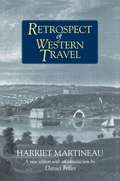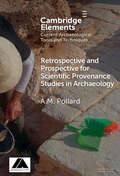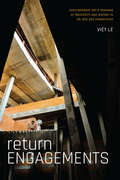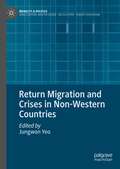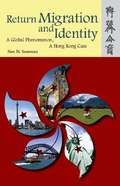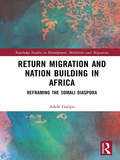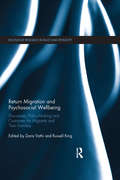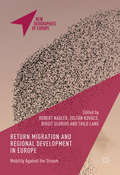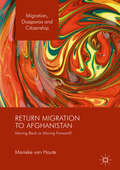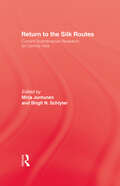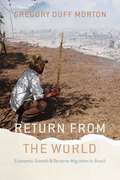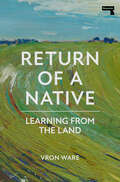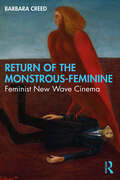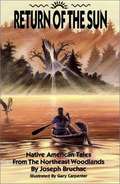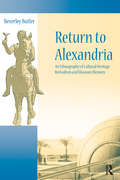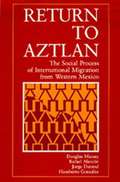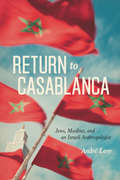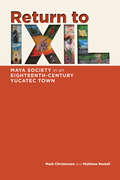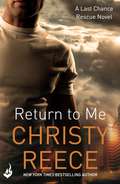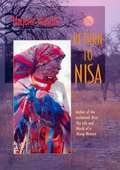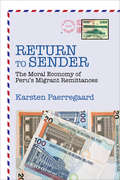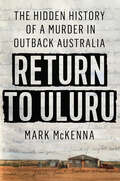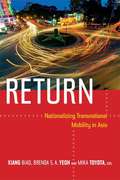- Table View
- List View
Retrospect of Western Travel
by Harriet Martineau"This new abridgement of the original 1838 edition offers a view of Jacksonian America. Here are Martineau's condemnation of slavery and her championship of abolition and women's rights; her incisive portraits of Jackson, Clay, Calhoun, Webster, Garrison, Emerson, and the Beechers; her observations of American schools, asylums, colleges, and prisons; and her eyewitness accounts of a presidential assassination attempt, a lynch mob, a slave auction, a Quaker wedding, and a Harvard commencement. Historian Daniel Feller, author of The Jacksonian Promise, introduces the narrative, identifies the major characters, and provides an index for easy use. "--BOOK JACKET. Title Summary field provided by Blackwell North America, Inc. All Rights Reserved
Retrospective and Prospective for Scientific Provenance Studies in Archaeology (Elements in Current Archaeological Tools and Techniques)
by A. M. PollardProvenance has been one of the major scientific applications in archaeology for a hundred years. The 'Golden Age' began in the 1950s, when large programmes were initiated focussing on bronzes, ceramics, and lithics. However, these had varying impact, ranging from wide acceptance to outright rejection. This Element reviews some of these programmes, mainly in Eurasia and North America, focussing on how the complexity of the material, and the effects of human behaviour, can impact on such studies. The conclusion is that provenance studies of lithic materials and obsidian are likely to be reliable, but those on ceramics and metals are increasingly complicated, especially in the light of mixing and recycling. An alternative is suggested, which focusses more on using scientific studies to understand the relationship between human selectivity and processing and the wider resources available, rather than on the simple question of 'where does this object come from'.
Return Engagements: Contemporary Art's Traumas of Modernity and History in Sài Gòn and Phnom Penh
by Viet LêIn Return Engagements artist and critic Việt Lê examines contemporary art in Cambodia and Việt Nam to rethink the entwinement of militarization, trauma, diaspora, and modernity in Southeast Asian art. Highlighting artists tied to Phnom Penh and Sài Gòn and drawing on a range of visual art as well as documentary and experimental films, Lê points out that artists of Southeast Asian descent are often expected to address the twin traumas of armed conflict and modernization, and shows how desirable art on these themes is on international art markets. As the global art market fetishizes trauma and violence, artists strategically align their work with those tropes in ways that Lê suggests allow them to reinvent such aesthetics and discursive spaces. By returning to and refashioning these themes, artists such as Tiffany Chung, Rithy Panh, and Sopheap Pich challenge categorizations of “diasporic” and “local” by situating themselves as insiders and outsiders relative to Cambodia and Việt Nam. By doing so, they disrupt dominant understandings of place, time, and belonging in contemporary art.
Return Migration and Crises in Non-Western Countries (Mobility & Politics)
by Jungwon YeoThis edited book focuses on the intersection of return migration and crises in non-Western countries. The book explores a wide range of theoretical and methodological perspectives while offering practical insights to address the intricate issues surrounding return migration and crises. The topics covered within this volume include return migration trends, the pivotal roles and contributions of return migrants, the social, psychological, and policy challenges faced by returnees, emerging issues stemming from return migration in their home countries, and the public and formal responses to return migration and the reintegration of returnees, and the roles of crises in these areas.This edited volume brings together diverse perspectives of academic researchers, practitioners, and policymakers on return migration. The book features cases of multiple non-Western countries in Asia (Philippines, China, India), Europe (Lithuania, Turkey, & Ukraine), the Middle East and North Africa (Morocco), and South America and the Caribbean (Mexico, Peru & Dominican Republic). Findings provide a unique opportunity to critically explore current thinking on return migration and investigate the relationship between migration and crisis from varying policy and operational viewpoints. This book, hence, attends to practitioners to develop creative solutions to both global and local policies and practices of return migration management in emerging market countries, which will support and accommodate both their returnees and residents amid challenging times.
Return Migration and Identity
by Nan M. SussmanThe global trend for immigrants to return home has unique relevance for:schemas-microsoft-com:office
Return Migration and Nation Building in Africa: Reframing the Somali Diaspora (Routledge Studies in Development, Mobilities and Migration)
by Adele GalipoReturn migration has received growing levels of attention in both academic and policy circles in recent years, as the African diaspora's role in contributing to the development of their country of origin has become apparent. However, little is known about the lived experiences of those who come back, and even less about the ways in which their return shapes socio-political dynamics on the ground. This book aims to unpack the complexities of migrant transnational experiences as situated in global political and economic processes. In particular, the book takes the case of the return of skilled and educated Somalis from Western Europe and North America, in an attempt to recast the idea of diaspora return and transnational ethnography in a more political light, and to show how these returnees are both subject to and generative of important political conditions that are transforming Somaliland society. Overall, the book captures the complexities of the migrant's position, showing that "return" is rarely permanent, and that success comes from perpetuating the transnational stance. This book will appeal to scholars of migration, diaspora, development and African studies, as well as to those interested in the Somali case specifically, the third biggest community of refugees in the world.
Return Migration and Psychosocial Wellbeing: Discourses, Policy-Making and Outcomes for Migrants and their Families (Routledge Research in Race and Ethnicity)
by Russell King Zana VathiReturn migration is a topic of growing interest among academics and policy makers. Nonetheless, issues of psychosocial wellbeing are rarely discussed in its context. Return Migration and Psychosocial Wellbeing problematises the widely-held assumption that return to the country of origin, especially in the context of voluntary migrations, is a psychologically safe process. By exploding the forced-voluntary dichotomy, it analyses the continuum of experiences of return and the effect of time, the factors that affect the return process and associated mobilities, and their multiple links with returned migrants' wellbeing or psychosocial issues. Drawing research encompassing four different continents – Europe, North America, Africa and Asia – to offer a blend of studies, this timely volume contrasts with previous research which is heavily informed by clinical approaches and concepts, as the contributions in this book come from various disciplinary approaches such as sociology, geography, psychology, politics and anthropology. Indeed, this title will appeal to academics, NGOs and policy-makers working on migration and psychosocial wellbeing; and undergraduate and postgraduate students who are interested in the fields of migration, social policy, ethnicity studies, health studies, human geography, sociology and anthropology.
Return Migration and Regional Development in Europe
by Zoltán Kovács Robert Nadler Birgit Glorius Thilo LangThis book assesses recent migration patterns in Europe, which have significantly included 'return migration' against the stream of East-West migration. Since the Eastern enlargement of the EU, many regions of Central and Eastern European have experienced a loss of human resources in core industries, raising concerns about social, economic and territorial cohesion in the region. The success rates of national and regional governmental policy aiming to retain or re-attract skilled workers have been variable, yet return migration has emerged as a major element of migration flows. Bringing together leading researchers on this important topic in contemporary European geography, the contributors analyse a series of key issues. These include: theoretical frameworks in the field of return migration; the nexus between return migration and regional development; the effects of the global and European crisis on emigration and return migration; non-economic motivations for emigration and return; the intergenerational character of return migration, and; the reintegration of return migrants into post-socialist societies. Taken together, the chapters see return migrants as important agents of change, innovation and economic growth. The book will be of great interest for scholars and students of human, economic and political geography.
Return Migration and Regional Economic Problems (Routledge Library Editions: Economic Geography)
by Russell KingThis book, originally published in 1986, based on extensive original research, presents many findings on the phenomenon of return migration and on its impact on regional economic development. It remains the only study of its kind. International in scope, the book includes chapters on return migration in Italy, Portugal, Greece, Ireland, Jordan, Canada, Jamaica, Algeria and the Middle East.
Return Migration to Afghanistan
by Marieke Van HouteThis book overcomes the dichotomies, generalizations and empirical shortcomings that surround the understanding of return migration within the migration-development-peace-building nexus. Using the concept of multidimensional embeddedness, it provides an encompassing view of returnees' identification with and participation in one or multiple spaces of belonging. It introduces Afghan return migration from Europe as a relevant case study, since the country's protracted history of conflict and migration shows how the globally changing political discourses of recent decades have shaped migration strategies. The author's findings highlight the fact that policy is responding inadequately to complex issues of migration, conflict, development and return, since the expectations on which it is based only account for a small minority of returnees. This thought-provoking book will appeal to scholars of migration and refugee studies, as well as a wider audience of sociologists, anthropologists, demographers and policy makers.
Return Migration to Afghanistan: Moving Back or Moving Forward? (Migration, Diasporas and Citizenship)
by Marieke van HouteThis book overcomes the dichotomies, generalizations and empirical shortcomings that surround the understanding of return migration within the migration–development–peace-building nexus. Using the concept of multidimensional embeddedness, it provides an encompassing view of returnees’ identification with and participation in one or multiple spaces of belonging. It introduces Afghan return migration from Europe as a relevant case study, since the country’s protracted history of conflict and migration shows how the globally changing political discourses of recent decades have shaped migration strategies. The author’s findings highlight the fact that policy is responding inadequately to complex issues of migration, conflict, development and return, since the expectations on which it is based only account for a small minority of returnees. This thought-provoking book will appeal to scholars of migration and refugee studies, as well as a wider audience of sociologists, anthropologists, demographers and policy makers.
Return To The Silk Routes
by JuntunenFirst Published in 1999. Routledge is an imprint of Taylor & Francis, an informa company.
Return from the World: Economic Growth and Reverse Migration in Brazil
by Gregory Duff MortonAn anthropologist’s investigation of why some Brazilians choose to leave behind a booming economy and return to their villages. In Return from the World, anthropologist Gregory Duff Morton traces the migrations of Brazilian workers who leave a thriving labor market and return to their home villages to become peasant farmers. Morton seeks to understand what it means to turn one’s back deliberately on the promise of economic growth. Giving up their positions in factories, at construction sites, and as domestic workers, these migrants travel thousands of miles back to villages without running water or dependable power. There, many take up subsistence farming. Some become activists with the MST, Brazil’s militant movement of landless peasants. Bringing their stories vividly to life, Morton dives into the dreams and disputes at play in finding freedom in the shared rejection of growth.
Return of a Native: Learning from the Land
by Vron WareFrom a fixed point in the middle of English nowhere, Vron Ware takes you through time and space to explain why transcending the urban-rural divide is integral to the future of the planet.Rural England is a mythic space, a complex canvas on which people from many different backgrounds project all kinds of fantasies, prejudices, desires and fears. This book seeks to challenge many of these ideas, showing how the artificial divide between rural and urban works to conceal the underlying relationship between these two fundamental poles of human settlement.This investigation of rurality is oriented from a fixed point in north-west Hampshire, marked by a signpost that points in four directions to two towns, four villages and two hamlets. Through stories, interviews and reportage gathered over two decades, the book demolishes tired notions of rural England that cast it as a separate realm of existence, whether marooned in a perpetual time-warp, or reduced to a refuge for the retired, wealthy urbanites, extreme nature-lovers, and, more recently, anyone tired of waiting out the pandemic in towns and cities. It poses two simple questions: what does the word rural mean today? What will it mean tomorrow?The author is an ambivalent native, held captive to the land by an umbilical cord but always on the verge of fleeing home to the city. She writes from a feminist, postcolonial standpoint that is alert to the slow violence of historical processes taking place over many centuries; enslavement, colonialism, industrialisation, globalisation. Both argument and narrative are propelled by the urgent need to reconsider the concept of &‘countryside&’ in the context of the climate emergency and the patent collapse of ecosystems due to intensive farming which has poisoned the land.
Return of the Monstrous-Feminine: Feminist New Wave Cinema
by Barbara CreedThis follow-up to the classic text of The Monstrous-Feminine analyses those contemporary films which explore social justice issues such as women’s equality, violence against women, queer relationships, race and the plight of the planet and its multi-species. Examining a new movement – termed by Creed as Feminist New Wave Cinema – The Return of the Monstrous-Feminine explores a significant change that has occurred over the past two decades in the representation of the monstrous-feminine in visual discourse. The Monstrous-Feminine is a figure in revolt on a journey through the dark night of abjection. Taking particular interest in women directors who create the figure of the Monstrous-Feminine, in cinema that foregrounds everyday horrors in addition to classic horror, Creed looks at a range of diverse films including The Babadook, A Girl Walks Home Alone at Night, Nomadland, Carol, Raw, Revenge, and the television series The Handmaid’s Tale. These films center on different forms of revolt, from inner revolt to social, supernatural and violent revolt, which appear in Feminist New Wave Cinema. These relate in the main to the emergence of a range of social protest movements that have gathered momentum in the new millennium and given voice to new theoretical and critical discourses. These include: third and fourth wave feminism, the #MeToo movement, queer theory, race theory, the critique of anthropocentrism and human animal theory. These theoretical discourses have played a key role in influencing Feminist New Wave Cinema whose films are distinctive, stylish and diverse. This is an essential companion to the original classic text and is ideal for students in Gender and Media, Gender and Horror, Gender and Film and Feminist Film theory courses.
Return of the Sun: Native American Tales From the Northeast Woodlands
by Joseph BruchacAn enchanting illustrated collection of Native American folktales, told with reverence and wit by the classic Native American storyteller, Joseph Bruchac.
Return to Alexandria: An Ethnography of Cultural Heritage Revivalism and Museum Memory (UCL Institute of Archaeology Critical Cultural Heritage Series)
by Beverley ButlerThe Bibliotheca Alexandrina was launched with great fanfare in the 1990s, a project of UNESCO and the Egyptian government to recreate the glory of the Alexandria Library and Museion of the ancient world. The project and its timing were curious—it coincided with scholarship moving away from the dominance of the western tradition; it privileged Alexandria’s Greek heritage over 1500 years of Islamic scholarship; and it established an island for the cultural elite in an urban slum. Beverley Butler’s ethnography of the project explores these contradictions, and the challenges faced by Egyptian and international scholars in overcoming them. Her critique of the underlying foundational concepts and values behind the Library is of equal importance, a nuanced postcolonial examination of memory, cultural revival, and homecoming. In this, she draws upon a wide array of thinkers: Freud, Derrida, Said, and Bernal, among others. Butler’s book will be of great value to museologists, historians, archaeologists, cultural scholars, and heritage professionals.
Return to Aztlan: The Social Process of International Migration from Western Mexico
by Douglas S. Massey Jorge Durand Humberto González Rafael AlarcónReturn to Aztlan analyzes the social process of international migration through an intensive study of four carefully chosen Mexican communities. The book combines historical, anthropological, and survey data to construct a vivid and comprehensive picture of the social dynamics of contemporary Mexican migration to the United States.
Return to Casablanca
by André LevyIn this book, Israeli anthropologist André Levy returns to his birthplace in Casablanca to provide a deeply nuanced and compelling study of the relationships between Moroccan Jews and Muslims there. Ranging over a century of history--from the Jewish Enlightenment and the impending colonialism of the late nineteenth century to today's modern Arab state--Levy paints a rich portrait of two communities pressed together, of the tremendous mobility that has characterized the past century, and of the paradoxes that complicate the cultural identities of the present. Levy visits a host of sites and historical figures to assemble a compelling history of social change, while seamlessly interweaving his study with personal accounts of his returns to his homeland. Central to this story is the massive migration of Jews out of Morocco. Levy traces the institutional and social changes such migrations cause for those who choose to stay, introducing the concept of "contraction" to depict the way Jews deal with the ramifications of their demographic dwindling. Turning his attention outward from Morocco, he goes on to explore the greater complexities of the Jewish diaspora and the essential paradox at the heart of his adventure--leaving Israel to return home.
Return to Ixil: Maya Society in an Eighteenth-Century Yucatec Town
by Matthew Restall Mark Z. ChristensenReturn to Ixil is an examination of over 100 colonial-era Maya wills from the Yucatec town of Ixil, presented together and studied fully for the first time. These testaments make up the most significant corpus of Maya-language documents from the colonial period. Offering an unprecedented picture of material and spiritual life in Ixil from 1738 to 1779, they are rare and rich sources for the study of Maya culture and history. Supplemented with additional archival research, the wills provide new and detailed descriptions of various aspects of life in eighteenth-century Ixil. In each chapter, authors Mark Christensen and Matthew Restall examine a different dimension of Ixil’s colonial history, including the role of notaries, Maya participation in a coastal militia, economy and modes of production, religious life and records, and the structures and patterns of familial relationships. These details offer insight into the complex network of societies in colonial Yucatan, colonial Mesoamerica, and colonial Latin America. Including an appendix presenting the original Maya texts as well as translations by Christensen and Restall, Return to Ixil not only analyzes the largest body of substantive wills in any Mayan language known today but also provides a rare closeup view of the inner workings of a colonial Maya town and the communal and familial affairs that made up a large part of the Maya colonial experience. It will be of great interest to Mayanists as well as to students and scholars of history, anthropology, ethnohistory, linguistics, and social history. The publication of this book is supported in part byBrigham Young University and Penn State University.
Return to Me: Last Chance Rescue Book 2 (Last Chance Rescue)
by Christy ReeceFor fans of Maya Banks, Nina Bruhns, Pamela Clare and Julie Ann Walker. The second novel in New York Times bestselling author Christy Reece's addictive Last Chance Rescue series of sexy suspense and thrilling adventure. Smart, fiery, and fresh from a broken engagement, Samara Lyons is up for the challenge of trapping an online predator. But in this high stakes op, with the fate of dozens of innocent lives on the line, she could do without the distraction of her increasing feelings for her boss. Noah McCall, head of Last Chance Rescue, can't disguise his raw, physical desire for Samara. When the sting explodes, Noah is forced to face his dark past, while Samara has to fight to stay alive. Now it's all about survival. Will they find a way to return to the life they now long for together?Don't miss the other pulse-pounding novels in the Last Chance Rescue series, Rescue Me, Run To Me, No Chance, Second Chance, Last Chance, Sweet Justice, Sweet Revenge, and Sweet Reward, or the steamy southern suspense of the Wildefire series by Christy's alter-ego Ella Grace which begins with Midnight Secrets.
Return to Nisa
by Marjorie ShostakThis is the story of two women--one a hunter-gatherer in Botswana, the other an ailing American anthropologist,and the remarkable relationship between these two women from different worlds.
Return to Sender: The Moral Economy of Peru's Migrant Remittances
by Karsten PaerregaardThe aim of this book is to examine how Peruvian migrants living in different parts of the world use their savings and experience in Peru as well as to the development of their regions of origin and new countries of settlement.<P> The book's title, Return to Sender, refers to the money that migrants send to their relatives and communities in Peru. But even though the sending of remittances is the book's main them, it also explores another less-documented aspect of migration: the many talents that Peruvian migrants mobilize to achieve their goals. The book is therefore not only a study of why and how migrants remit money home, but also an account of the ways they make their dreams come true and hereby enrich the surrounding society.
Return to Uluru: The Hidden History of a Murder in Outback Australia
by Mark McKenna"THIS WEEK'S HOTTEST NEW RELEASES: Murder befouls the outback... [A] gripping work of true crime." —USA TODAYReturn to Uluru explores a cold case that strikes at the heart of white supremacy—the death of an Aboriginal man in 1934; the iconic life of a white, "outback" police officer; and the continent's most sacred and mysterious landmark.Inside Cardboard Box 39 at the South Australian Museum&’s storage facility lies the forgotten skull of an Aboriginal man who died eighty-five years before. His misspelled name is etched on the crown, but the many bones in boxes around him remain unidentified. Who was Yokununna, and how did he die? His story reveals the layered, exploitative white Australian mindset that has long rendered Aboriginal reality all but invisible. When policeman Bill McKinnon&’s Aboriginal prisoners escape in 1934, he&’s determined to get them back. Tracking them across the so called "dead heart" of the country, he finds the men at Uluru, a sacred rock formation. What exactly happened there remained a mystery, even after a Commonwealth inquiry. But Mark McKenna&’s research uncovers new evidence, getting closer to the truth, revealing glimpses of indigenous life, and demonstrating the importance of this case today. Using McKinnon&’s private journal entries, McKenna paints a picture of the police officer's life to better understand how white Australians treat the center of the country and its inhabitants. Return to Uluru dives deeply into one cold case. But it also provides a searing indictment of the historical white supremacy still present in Australia—and has fascinating, illuminating parallels to the growing racial justice movements in the United States.
Return: Nationalizing Transnational Mobility in Asia
by Biao Xiang Mika Toyota Brenda S. YeohSince the late 1990s, Asian nations have increasingly encouraged, facilitated, or demanded the return of emigrants. In this interdisciplinary collection, distinguished scholars from countries around the world explore the changing relations between nation-states and transnational mobility. Taking into account illegally trafficked migrants, deportees, temporary laborers on short-term contracts, and highly skilled émigrés, the contributors argue that the figure of the returnee energizes and redefines nationalism in an era of increasingly fluid and indeterminate national sovereignty. They acknowledge the diversity, complexity, and instability of reverse migration, while emphasizing its discursive, policy, and political significance at a moment when the tensions between state power and transnational subjects are particularly visible. Taken together, the essays foreground Asia as a useful site for rethinking the intersections of migration, sovereignty, and nationalism.Contributors. Sylvia Cowan, Johan Lindquist, Melody Chia-wen Lu, Koji Sasaki, Shin Hyunjoon, Mariko Asano Tamanoi, Mika Toyota, Carol Upadhya, Wang Cangbai, Xiang Biao, Brenda S. A. Yeoh
